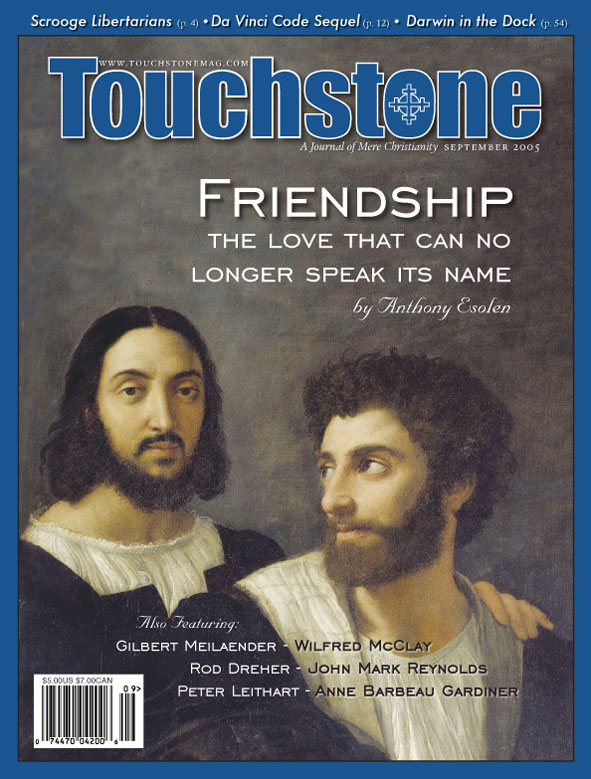Passing on the Right
The Religious Blind Spot of Modern Liberals
I often wonder what advantage publications like the New York Times Book Review see in unabashed identification with political and social liberalism. What place, for example, do the surprisingly strident and crude attacks on President Bush in its pages during the last election have to do with the review of books for an upper-level general audience, a mission that would seem to profit from a reasonable degree of editorial equanimity?
There have been times during the last several years when the magazine has brought me the uncanny sensation of swift backward movement: Suddenly I am no longer reading a distinguished review of books, but underground newspaper juvenilia from the seventies. One would think a more effective approach, given the desire for the largest possible audience, would be for the editors’ liberalism to be expressed in cooler and more understated ways.
As someone who has read the Review for years, my suspicion is that its editors have settled into the mood of those for whom nonliberals simply don’t count, in the sense of being worthy to understand or appeal to. Books as carriers of knowledge and information are for those who can profit by reading. Books as entertainment are of no interest to puritans. So why maintain the useless ruse that the magazine is for anyone but People Like Us? (I suspect this decline into journalistic solipsism among liberals because I have seen it happen among conservatives. It takes a good deal of editorial discipline to keep it from happening.)
The Winning Right
The Right, however, is winning elections, something must be done about it, and the Review has shown itself more than willing to give explicit service for the cause. In this year’s March 6 issue it ran a feature titled, “Left Behind: Can the Democrats Become a Major Party Again?”—a discussion between Peter Beinart, editor of The New Republic, Michael Tomasky, executive editor of The American Prospect, and Katrina vanden Heuvel, editor of The Nation, described by the preface as “three leading voices for liberalism today.”
They agreed that the party’s loss of appeal to a traditional constituency had to be corrected if it is to return to power, but the discussion proceeded in the atmosphere of an interesting ambivalence. They recognized that issues like abortion, homosexual marriage, and the media trash to which current interpretation of the First Amendment is exposing children in particular, loomed large on the agenda of the opposition. There was also a fairly clear understanding that this opposition is primarily “religious.”
But they showed very little knowledge of religion or religious people, and they made no attempt to pursue the implications of the insight. The conversation kept slipping back into political mode, as though the party could regain lost ground by a campaign to inform and appeal to its traditional constituency—labor, various strains of cultural liberal and progressivist—on issues where it has the better plan.
Note Mr. Tomasky’s fascinating remark:
One of the Democratic Party’s problems is that it doesn’t have enough contact with its rank and file. Right-wing people in this country have a place to meet and talk politics—their churches, increasingly megachurches in the exurbs. There’s not a meeting place like that for liberals and Democrats.
One wonders if he’d forgotten the richly government-funded left-wing forums called “universities.”
S. M. Hutchens is a senior editor and longtime writer for Touchstone.
subscription options
Order
Print/Online Subscription

Get six issues (one year) of Touchstone PLUS full online access including pdf downloads for only $39.95. That's only $3.34 per month!
Order
Online Only
Subscription

Get a one-year full-access subscription to the Touchstone online archives for only $19.95. That's only $1.66 per month!
bulk subscriptions
Order Touchstone subscriptions in bulk and save $10 per sub! Each subscription includes 6 issues of Touchstone plus full online access to touchstonemag.com—including archives, videos, and pdf downloads of recent issues for only $29.95 each! Great for churches or study groups.
Transactions will be processed on a secure server.
more from the online archives

8.4—Fall 1995
The Demise of Biblical Preaching
Distortions of the Gospel and its Recovery by Donald G. Bloesch
calling all readers
Please Donate
"There are magazines worth reading but few worth saving . . . Touchstone is just such a magazine."
—Alice von Hildebrand
"Here we do not concede one square millimeter of territory to falsehood, folly, contemporary sentimentality, or fashion. We speak the truth, and let God be our judge. . . . Touchstone is the one committedly Christian conservative journal."
—Anthony Esolen, Touchstone senior editor









